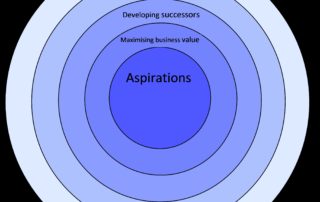Why do so few businesses have a decent strategy?
In my 25 years as a business psychologist, I've worked with a lot of businesses, particularly mid-sized companies, and it's surprising just how few of them have a decent strategy. By 'a decent strategy' I mean that the business knows where it's going and how it's going to get there. "We want to double in size in the next five years" - a surprisingly common aspiration - is not a strategy. Double what? Turnover? Profit? Market share? Even if the overall goal is clear, the route to get there is often sketchy. This is unlikely to surprise you if you ...
How should we address climate change at work? Part 2 – let’s talk about it
In November I wrote the first of a two-part series looking at the climate crisis in a work context. It explored the psychological barriers that stop us even thinking about the subject and ended with a promise that next time I'd explore what we should actually do. It's taken me four months to reach the conclusion that I don't know. And actually, that's ok. Why would I know when everyone's situation is so different? But what I have realised is that we need to normalise talking about the climate at work. Having spoken to a lot of people who have ...
How should we address climate change at work? Part 1 – thinking about it.
This is the first of a two part series on the key topic of our age, the climate crisis. Specifically, looking at it in the context of work. Your immediate reaction might be "Really, do I have to? It's bad enough when it's on the news and I have got quite a lot on right now". I get it. I feel similar. But here are two reasons why I think it's worth looking at the subject: It will affect you Over the next decade or so, maybe sooner, climate change is going to affect everything - geopolitics, the global and ...
In too deep? 7 questions to judge how involved to get in a piece of work
How involved should you get in work which is not your sole responsibility? It sounds like a straightforward question, but actually it can be quite tricky to work out. I've been thinking about this lately while coaching a client I'll call Brian. Brian is a very senior manager in a large and complex organisation, who has just taken on a role which sits outside the organisation structure. He's a kind of chief of staff to the CEO, his eyes and ears. He fixes things. He has no staff of his own. Brian is having coaching to help him navigate the ...
The psychology of influence – Seven psychological insights to increase your influence
I'm sure most of us would like to be more influential. You probably won't be surprised to hear that understanding a bit of psychology can help. Ultimately, influence is all about decision-making. You want someone to decide to do what you want them to do. What psychological research tells us is that decision-making is such hard work that our brains take shortcuts. We don't even notice it's happening. Understanding those predictable shortcuts can help us influence decision making in others. Dr. Robert Cialdini has identified six psychological levers of influence, which I'll outline below, along with a seventh based on a ...
Passing the baton – A succession planning guide
How do you hand on a business you’ve spent years nurturing? This is a challenge facing many business owners as they eventually accept that they cannot go on forever. This month I’ve teamed up with Peter Jenner, from William Battle Ltd, who specialises in business succession to compare his process-focused approach with my psychological perspective. Peter has a model which aims to plot a course for successful succession, which he envisages as concentric circles radiating out like ripples from the centre, though obviously there’s overlap between them. Aspirations Peter says: Everything starts with aspirations – yours and those of your likely ...
“Maybe you should see a psychologist” – How do you bring up this sensitive subject?
"Maybe you should see a psychologist". Has anyone ever suggested this to you? If they did, would you see it as a positive suggestion or would you be affronted, as if they were implying that all was not right in your head? It's tricky, isn't it? A bit of a taboo subject. Recently, I've had a few conversations with people who've said they think it would be helpful if their colleague/client/boss/friend talked to me but they don't know quite how to broach the subject. Let's be clear here, I'm talking about work-related issues. I'm neither a psychotherapist nor a clinical ...
You can lead a horse to water – A powerful psychological technique to encourage change
How do you persuade people to change? Maybe you have a colleague or a client who stubbornly refuses to do the one thing that everyone else can see would be in their best interests – the overloaded manager who won't delegate, the blundering leader who really needs coaching but sees it as a navel-gazing waste of time; the 60-something family business owner who really wants to hand the business on to his children “one day” but refuses to talk about succession planning. Perhaps you’ve tried all your best arguments, outlined the problem and painted a positive vision of change and ...
Need a NED? How to avoid the pitfalls when engaging a Non-Executive Director
A good non-exec director can do wonders for an SME, bringing experience and a different perspective, acting as a sounding board and challenging the exec team to ensure they focus on the right stuff: the important not the urgent, the long-term strategy, good corporate governance and so on. And yet companies don’t always seem to get non-exec appointments right. I want to explore some of the pitfalls, but first let’s go back to basics: What makes a good NED? Sometimes NEDs are recruited for their specialist skills and knowledge or their contacts and reputation in a particular market. Other times, companies ...
Been there, done that, got the t-shirt. How much experience do you need to dabble in someone else’s job?
How much do you need to know about someone else’s job to have a say in it? Do you have to have done the job yourself to know whether they’re doing it properly? Common sense would suggest not – you don’t have to be a trained chef to recognise a badly cooked meal, for example. Yet a lot of people, particularly highly technical people, like engineers or IT professionals, seem to take umbrage at anyone who doesn’t share their expertise having any involvement in their jobs at all. In this blog I’m exploring how much you need to know to ...
Why do so few businesses have a decent strategy?
In my 25 years as a business psychologist, I've worked with a lot of businesses, particularly mid-sized companies, and it's surprising just how few of them have a decent strategy. By 'a decent strategy' I mean that the business knows where it's going and how it's going to get there. "We want to double in size in the next five years" - a surprisingly common aspiration - is not a strategy. Double what? Turnover? Profit? Market share? Even if the overall goal is clear, the route to get there is often sketchy. This is unlikely to surprise you if you ...
How should we address climate change at work? Part 2 – let’s talk about it
In November I wrote the first of a two-part series looking at the climate crisis in a work context. It explored the psychological barriers that stop us even thinking about the subject and ended with a promise that next time I'd explore what we should actually do. It's taken me four months to reach the conclusion that I don't know. And actually, that's ok. Why would I know when everyone's situation is so different? But what I have realised is that we need to normalise talking about the climate at work. Having spoken to a lot of people who have ...
How should we address climate change at work? Part 1 – thinking about it.
This is the first of a two part series on the key topic of our age, the climate crisis. Specifically, looking at it in the context of work. Your immediate reaction might be "Really, do I have to? It's bad enough when it's on the news and I have got quite a lot on right now". I get it. I feel similar. But here are two reasons why I think it's worth looking at the subject: It will affect you Over the next decade or so, maybe sooner, climate change is going to affect everything - geopolitics, the global and ...
In too deep? 7 questions to judge how involved to get in a piece of work
How involved should you get in work which is not your sole responsibility? It sounds like a straightforward question, but actually it can be quite tricky to work out. I've been thinking about this lately while coaching a client I'll call Brian. Brian is a very senior manager in a large and complex organisation, who has just taken on a role which sits outside the organisation structure. He's a kind of chief of staff to the CEO, his eyes and ears. He fixes things. He has no staff of his own. Brian is having coaching to help him navigate the ...
The psychology of influence – Seven psychological insights to increase your influence
I'm sure most of us would like to be more influential. You probably won't be surprised to hear that understanding a bit of psychology can help. Ultimately, influence is all about decision-making. You want someone to decide to do what you want them to do. What psychological research tells us is that decision-making is such hard work that our brains take shortcuts. We don't even notice it's happening. Understanding those predictable shortcuts can help us influence decision making in others. Dr. Robert Cialdini has identified six psychological levers of influence, which I'll outline below, along with a seventh based on a ...
Passing the baton – A succession planning guide
How do you hand on a business you’ve spent years nurturing? This is a challenge facing many business owners as they eventually accept that they cannot go on forever. This month I’ve teamed up with Peter Jenner, from William Battle Ltd, who specialises in business succession to compare his process-focused approach with my psychological perspective. Peter has a model which aims to plot a course for successful succession, which he envisages as concentric circles radiating out like ripples from the centre, though obviously there’s overlap between them. Aspirations Peter says: Everything starts with aspirations – yours and those of your likely ...
“Maybe you should see a psychologist” – How do you bring up this sensitive subject?
"Maybe you should see a psychologist". Has anyone ever suggested this to you? If they did, would you see it as a positive suggestion or would you be affronted, as if they were implying that all was not right in your head? It's tricky, isn't it? A bit of a taboo subject. Recently, I've had a few conversations with people who've said they think it would be helpful if their colleague/client/boss/friend talked to me but they don't know quite how to broach the subject. Let's be clear here, I'm talking about work-related issues. I'm neither a psychotherapist nor a clinical ...
You can lead a horse to water – A powerful psychological technique to encourage change
How do you persuade people to change? Maybe you have a colleague or a client who stubbornly refuses to do the one thing that everyone else can see would be in their best interests – the overloaded manager who won't delegate, the blundering leader who really needs coaching but sees it as a navel-gazing waste of time; the 60-something family business owner who really wants to hand the business on to his children “one day” but refuses to talk about succession planning. Perhaps you’ve tried all your best arguments, outlined the problem and painted a positive vision of change and ...
Need a NED? How to avoid the pitfalls when engaging a Non-Executive Director
A good non-exec director can do wonders for an SME, bringing experience and a different perspective, acting as a sounding board and challenging the exec team to ensure they focus on the right stuff: the important not the urgent, the long-term strategy, good corporate governance and so on. And yet companies don’t always seem to get non-exec appointments right. I want to explore some of the pitfalls, but first let’s go back to basics: What makes a good NED? Sometimes NEDs are recruited for their specialist skills and knowledge or their contacts and reputation in a particular market. Other times, companies ...
Been there, done that, got the t-shirt. How much experience do you need to dabble in someone else’s job?
How much do you need to know about someone else’s job to have a say in it? Do you have to have done the job yourself to know whether they’re doing it properly? Common sense would suggest not – you don’t have to be a trained chef to recognise a badly cooked meal, for example. Yet a lot of people, particularly highly technical people, like engineers or IT professionals, seem to take umbrage at anyone who doesn’t share their expertise having any involvement in their jobs at all. In this blog I’m exploring how much you need to know to ...








